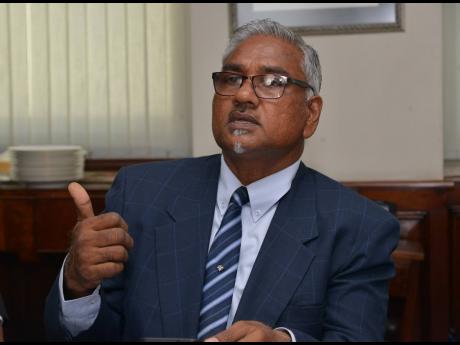Look out for suicide warning signs, advises Thomas
With one person around the world committing suicide every 40 seconds, a local suicidologist is urging Jamaicans to look out for signs of distress in others around them and reach out to assist them, getting professional help if necessary, to steer them to choose life.
Speaking with The Gleaner ahead of today’s World Suicide Prevention Day, which is being observed under the theme ‘Working Together to Prevent Suicide’, Dr Donovan Thomas said there are usually warning signs before a person commits suicide, and being able to spot them is critical.
Among the indicators of vulnerability to suicide are persons frequently talking about death or making threats to take their own lives.
He explained that every threat, whether subtle or outright, must be taken seriously.
Globally, suicide racks up a grim toll of close to 800,000 deaths each year, and Jamaica is not immune to the reality. The Economic and Social Survey Jamaica 2019 showed a decline in the total number of suicides last year to 58, falling from 60 in 2018.
The majority of those who took their lives locally were males, accounting for 87.9 per cent, with hanging as the most common method used. There were two victims below the age of 15 years, eight between 15 and 24 years and eight over 65 years.
The parishes of Manchester and Clarendon recorded the highest number of cases last year, with nine and seven, respectively.
According to the police, up to September 7, there had been 29 cases of suicide in the island this year, with 26 of them being males. Among the toll is an eight-year-old girl from Old Harbour, St Catherine, whose body was found hanging late last month.
Suicide prevention remains a universal challenge every year, and the International Association for Suicide Prevention (IASP) approximates that for each suicide, 135 people suffer intense grief or are otherwise affected, as every life lost represents someone’s child, partner, parent, friend or colleague.
Thomas, who is Jamaica’s IASP national representative, told The Gleaner that preparation for death is another indicator of vulnerability and it can take many forms.
“The person who knows the place, the time and the method is much more at risk than the person who just says, ‘I want to kill myself’. Children will give away their toys or things that they consider valuable, and it’s the same for teenagers ... ,” explained Thomas, who is also the founder of Choose Life International. “Adults may tamper with insurance documents, make sure that things are in order, and the writing of [suicide] notes can go right across the age cohorts.”
He said he once received a call for help after a woman was planning to kill herself.
“Her preparation was giving away an eight-year-old child,” Thomas said.
WEAKENED WILL
He added that isolation can result in suicidal thoughts as humans are created to interact, and when that interaction does not happen, the will to live is sometimes weakened.
Thomas used the opportunity to encourage Jamaicans to deliberately check in with family and friends, especially those with existing challenges.
Having a negative view of self, drastic changes in mood, feeling like a burden to others, self-cutting behaviours and hopelessness are among the other warning signs.
He advises people experiencing suicidal thoughts to share them with a trusted person or professional, hand over any weapon they may have and disclose plans.
A 2019 U-Report, pioneered by UNICEF, showed that 42 per cent of attempted suicides treated at Jamaican hospitals are children.
“Whenever a person attempts suicide, it requires treatment. There are many instances when the parents, friends and other supporters mask it or pretend as if it were not so. The person should really get an assessment done – psychotherapy, talk about it and help the person to process the situation,” he explained, adding that it is important create a suicide escape plan and avoid condemning the person.
Tools to assess suicide risk
P – Plan: The more detailed the plan is, the closer the person is to the suicide act.
I – Intensity of the method: The more drastic the method, the more likely the person is to complete the act.
N – Nearness of the method: Does the person already have the means of death? Make every effort to separate the means of death from the person.
S – Support system: Provide as much support and reassure the person that they are important.
Jamaicans can contact the health ministry’s Mental Health and Suicide Prevention Helpline at 888-NEW-LIFE (639-5433).

